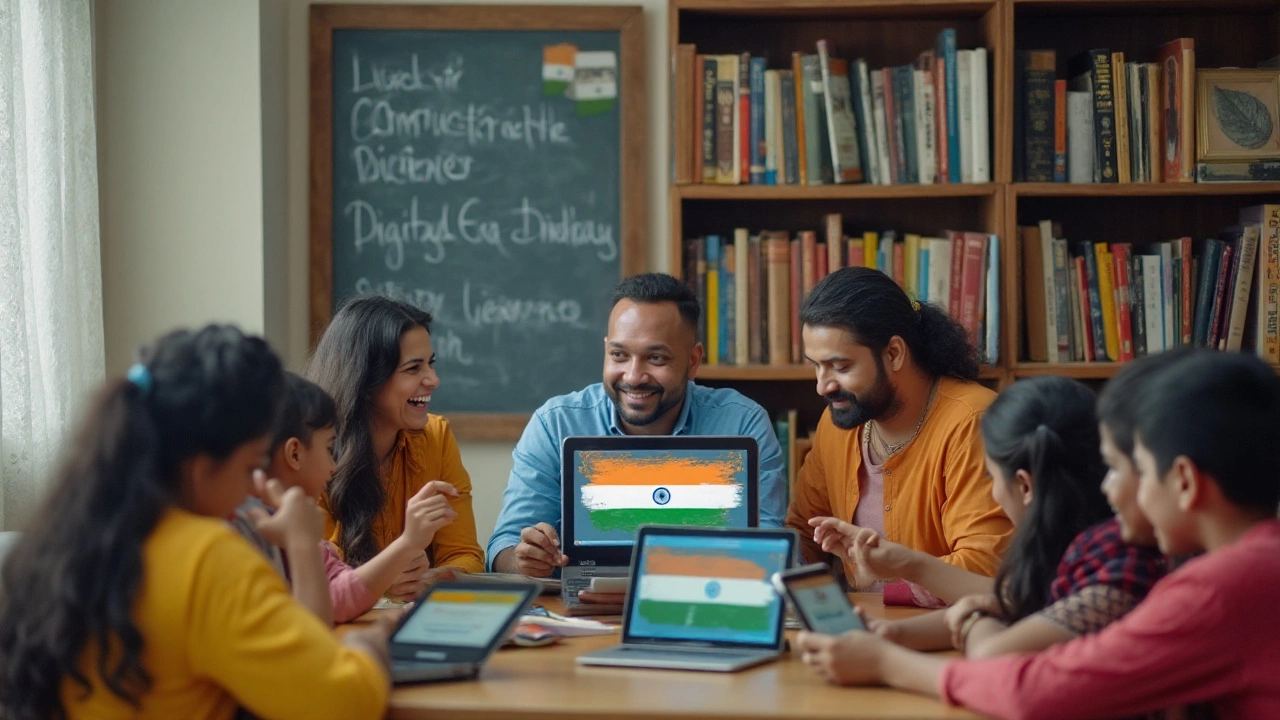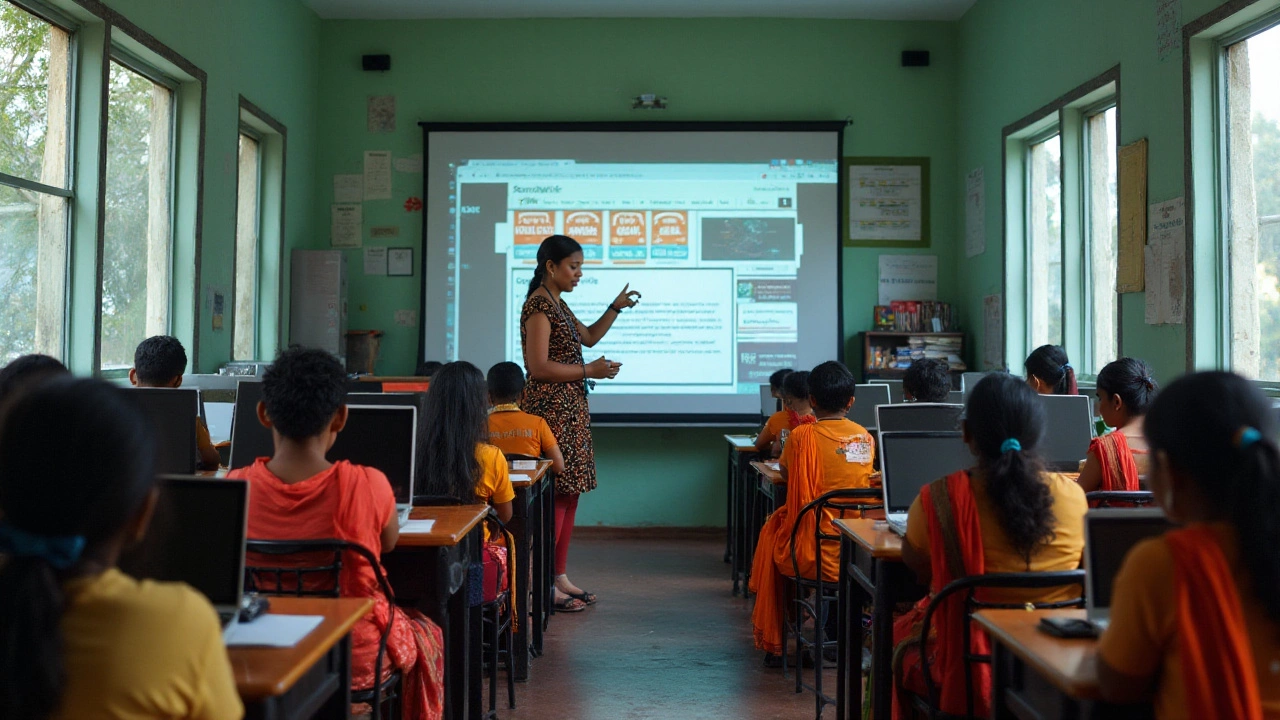Mastering Computer Skills in Just a Month: A Practical Guide for Learners in India
 Dec, 16 2024
Dec, 16 2024
In a world that's embracing technology at breakneck speed, the ability to understand and utilize a computer has transformed from a luxury to a necessity. People everywhere are recognizing the importance of computer literacy for both personal growth and career advancement. It begs the question: Can you actually learn essential computer skills within a month?
While it might seem ambitious, diving deep into the heart of computer knowledge in a short span is possible with the right guidance and resources. This is especially true in a country like India, where digital learning platforms and tech resources have blossomed significantly. With structured courses and strategic learning, even the novice can establish a firm grip on computer know-how in four weeks.
Let's explore the pathways, techniques, and tools that can turn this seemingly impossible task into an achievable reality.
- Understanding the Basics of Computer Literacy
- Choosing the Right Course for Speedy Learning
- Effective Learning Techniques and Strategies
- Tips to Accelerate Your Computer Learning Journey
- Resources and Tools Recommended in India
Understanding the Basics of Computer Literacy
Grasping the basics of computer literacy is akin to learning a new language intended to unlock a device's potential. In today's digital landscape, this involves not just the ability to operate computers but also an understanding of how they work. At its core, computer literacy encompasses fundamental skills like using a mouse and keyboard, navigating operating systems, and managing files effectively. Just as reading and writing are imperative for traditional literacy, these essential skills are foundational for anyone striving to thrive in a technologically driven world.
For many beginners, the pivotal question is where to start. One must begin by familiarizing themselves with the computer's hardware components, such as the monitor, CPU, and peripherals. This knowledge is vital because it empowers users to troubleshoot minor issues independently. Moreover, understanding software – from operating systems like Windows and Mac to basic applications like word processors and web browsers – forms the backbone of learning computer skills. In fact, a study from the Pew Research Center reports that around 90% of job listings require basic computer skills, emphasizing the necessity of these competencies in the job market.
Beyond hardware and software, digital literacy involves mastering internet navigation. This includes using web browsers efficiently, conducting effective online searches, and maintaining cyber security by recognizing potential online threats. The ability to differentiate reliable sources from misinformation online is invaluable, akin to critical thinking in reading. Experts often suggest utilizing free educational websites and online tutorials to cover these aspects, offering interactive and engaging content tailored for beginners in India. One notable quote from Bill Gates captures the essence of this learning journey:
"The computer was born to solve problems that did not exist before."
While self-paced learning is beneficial, structured education can significantly enhance one's progress. Enrolling in computer courses that emphasize hands-on experience can provide a guided exposure to real-world applications. Many educational platforms in India offer curated content, ranging from digital start-ups to government-backed initiatives, thus catering to a varied learner demographic. With the burgeoning rise of technology in India's economy, institutions have embraced these courses to equip citizens with indispensable skills.
A successful approach to computer training is to set practical goals and progressively tackle them. Starting with simple tasks, like sending an email or creating a basic spreadsheet, helps solidify one’s understanding. Engaging in daily practice, much like any routine, ensures consistent improvement and builds confidence. The skills gained open pathways to advanced learning, transforming the seemingly daunting tech world into an accessible domain. By diving into each subject area thoughtfully, the bridge from novice to digitally adept becomes considerably shorter.
Choosing the Right Course for Speedy Learning
When one sets out on the journey of acquiring new skills, especially in the realm of technology, the initial step is pivotal: selecting the right course. This step becomes even more critical when you are aiming to master a subject within the time constraint of a month. In India, a country radiating with educational diversity, the multitude of options at your disposal is both a boon and a challenge. Computer courses range widely in terms of content, duration, and intensity, making the choice daunting for a learner eager for swift and tangible results.
First, it’s important to identify your specific goals. Are you looking to learn basic computer operation, delve into programming, or perhaps explore digital design? Your end goal will significantly influence your course selection. Once clear, it’s wise to look for courses that are laser-focused on practical, hands-on learning experiences. Check platforms like Coursera, Udemy, and local institutes such as NIIT, which often offer tech skills courses tailored for quick learning. These platforms frequently update their catalogs to reflect current industry demands, ensuring that what you learn is immediately applicable.
In an interview with Tech Guru India, educational technology expert Suresh Kumar highlighted,
"Choosing a course is like writing the first chapter of a book. It sets the tone and pace for the unfolding story. In today's fast-paced world, it’s less about the breadth and more about depth and applicability."Consider his words as you make your choice. Look for syllabuses that emphasize core concepts crucial to your field of interest, as this is more beneficial for compressed study timelines.
Additionally, make it a point to read reviews and testimonials from past students. This often-overlooked step can save you from enrolling in courses that are more hype than substance. A course with effective peer reviews and real-life success stories often provides a more accurate preview of the learning journey ahead. With the abundance of online learning platforms in India, also consider those offering hybrid models, blending self-paced online modules with live instructor-led sessions, allowing for interaction and immediate feedback.
Through careful consideration and strategic planning, your selection of the right course becomes a foundation of your learning endeavour, steering your educational exploration towards success. While rapid learning is the goal, remember that a well-chosen course not only accelerates your journey but enriches every step along the way.

Effective Learning Techniques and Strategies
Embarking on a journey to learn computer skills within a tight timeframe necessitates adopting specific, effective techniques. One must first understand that structured learning can significantly enhance retention and understanding. Breaking down complex topics into smaller, manageable segments is a proven strategy to avoid feeling overwhelmed. This approach, often referred to as chunking, aids students in systematically tackling a computer course by focusing on individual components first before attempting to master the entire concept.
It’s crucial to select a learning rhythm that suits your style. Setting aside dedicated time each day not only helps with consistency but also establishes a routine that promotes regular engagement. Prolific historical artist Leonardo da Vinci once remarked, "Learning never exhausts the mind," emphasizing the importance of curiosity and persistent learning. This philosophy applies equally well to computer education, where staying curious can lead to deeper understanding and quicker knowledge absorption.
Active learning plays a pivotal role when diving into tech skills. Rather than passive reading or watching tutorials, involve yourself in hands-on projects. Apply the newly acquired knowledge to real-world scenarios, even if they start small. An activity as simple as coding a basic program or creating a spreadsheet can reinforce and deepen understanding. This active exploration cements the skills, making them far more memorable.
Don't underestimate the power of feedback. Participating in discussion forums or study groups can offer vital insights. Not only will you gain new perspectives, but you can also learn from peers' mistakes, which can be just as valuable. Platforms hosting Indian computer courses often include community features where learners exchange ideas, solving problems collectively and effectively, fostering a collaborative learning atmosphere.
Lastly, leverage a mix of multimedia tools and resources to cater to different learning preferences. Whether it's video lectures, interactive modules, or digital textbooks, diversifying your methods keeps the process engaging. According to a study by the National Training Laboratories, 'practice by doing' leads to a 75% retention rate, indicating practical exercises as some of the most effective learning strategies.
Tips to Accelerate Your Computer Learning Journey
Embarking on the journey to learn computer skills rapidly can seem daunting, but with the right techniques, it becomes both manageable and exciting. The initial step is to cultivate a mindset optimized for learning. Instead of a vague goal, identify specific areas where you want to build your proficiency and carve out a solid plan. Start with defining daily or weekly goals that are attainable yet challenging enough to propel you forward. Staying motivated is crucial, and small wins can help maintain your enthusiasm over time.
It's also beneficial to utilize a variety of learning modes. For instance, integrating visual and auditory content with practical applications can greatly enhance understanding and retention. Watching tutorial videos, enrolling in interactive online computer courses, and engaging in forums or tech communities offer different perspectives and can enrich your overall learning experience. Understanding complex topics like coding or graphic design becomes easier when multiple senses are engaged.
Moreover, real-world application of skills is essential. Try to engage in projects that require you to put your learning into practice, such as building a personal website or automating your spreadsheet tasks. This experiential learning is crucial because it solidifies theories through use. Also, don't shy away from seeking help or feedback; platforms like Stack Overflow or GitHub are filled with knowledge and experts who are usually willing to provide guidance.
The use of technology tools can further speed up your learning journey. Leveraging software like Evernote for note-taking, or apps like Trello for planning, can help structure your study time efficiently. These organizational tools enable you to break down vast subjects into manageable tasks. Furthermore, you might consider using keyboard shortcuts and software-specific hacks which can not only save time but also make your interaction with computers seamless. Remember, efficiency in usage can be as crucial as knowledge when learning rapidly.
"Learning never exhausts the mind." – Leonardo da Vinci
Don’t underestimate the power of a structured routine. Allocate a specific period each day dedicated solely to learning time. Consistency is what establishes momentum and creates lasting habits. Additionally, pairing your study sessions with healthy breaks can improve concentration and prevent burnout, keeping your mind fresh and receptive.
Lastly, accessing a blend of online and offline resources like books, webinars, workshops, and MOOCs can provide a comprehensive understanding and expose you to different viewpoints and teaching styles. Enrolling in a structured program in India that offers certification can also provide a sense of achievement and a valuable addition to your resume, which adds further encouragement to reach your goals.

Resources and Tools Recommended in India
When it comes to quickly learning computer courses in India, the abundance of resources and tools available can be both a blessing and a challenge. The first step is to identify platforms that offer structured and comprehensive content tailored to different learning paces. Websites like Coursera, Udemy, and edX have a substantial catalogue of courses ranging from basic computer literacy to advanced programming. Many of these platforms partner with prestigious Indian universities, providing certificates that hold significant weight in the job market. Another excellent resource is the National Programme on Technology Enhanced Learning (NPTEL), an initiative by the Government of India. NPTEL offers free online courses developed by IITs and IISc, making it an invaluable portal for high-quality learning.
Aside from formal courses, numerous practical tools are available to supplement your learning. Codecademy and Khan Academy are well-known for their interactive environments, which allow learners to practice coding and other skills in real time. These platforms emphasize hands-on experience, which is crucial when trying to acquire new skills quickly. For learners inclined towards free resources, the plethora of YouTube tutorials can’t be overlooked. Channels like GeeksforGeeks and Telusko provide detailed breakdowns of technical concepts, along with tips and tricks to use in the industry.
Local tech communities and workshops also play a significant role. Meetup apps and platforms like the HackerRank community provide opportunities for real-life interactions with fellow learners and professionals. These interactions often lead to discussions that help clarify doubts that online resources might not address directly. Additionally, leveraging social media platforms such as LinkedIn to connect with professionals and educators can provide insights and shortcuts to mastering tech skills.
One cannot overlook the impact of mobile learning apps, especially in a country like India, where smartphones are widely used. Apps such as SoloLearn and Mimo cater to different levels of learners, offering quick lessons and coding exercises suited for on-the-go learning. These apps break down complex topics into bite-sized lessons that fit perfectly into a tight learning schedule. They offer an array of languages and technologies to explore, helping learners focus on specific computer training aspects without getting overwhelmed by the breadth of material.
"The beautiful thing about learning is that nobody can take it away from you," declared B.B. King. As resources continue to grow, the adaptability of learners remains the key to success.
For those interested in statistics, a recent study highlighted that over 70% of Indian learners prefer mobile learning due to its convenience and accessibility. This reflects a global trend towards mobile-first education solutions as they provide flexibility and customizability that traditional learning often lacks. A minor yet essential option is libraries, especially digital libraries like Delnet and the National Digital Library of India, which offer access to scholarly articles, books, and theses that can deepen understanding and knowledge.
Overall, in India, aspiring learners aiming to master computer skills within a month have an exceptional array of resources at their disposal. By combining traditional courses with practical tools, workshops, and a personalized learning routine, it becomes possible to achieve meaningful progress. The key lies in the willingness to engage consistently with these resources and remain proactive in overcoming challenges that might arise along the journey.